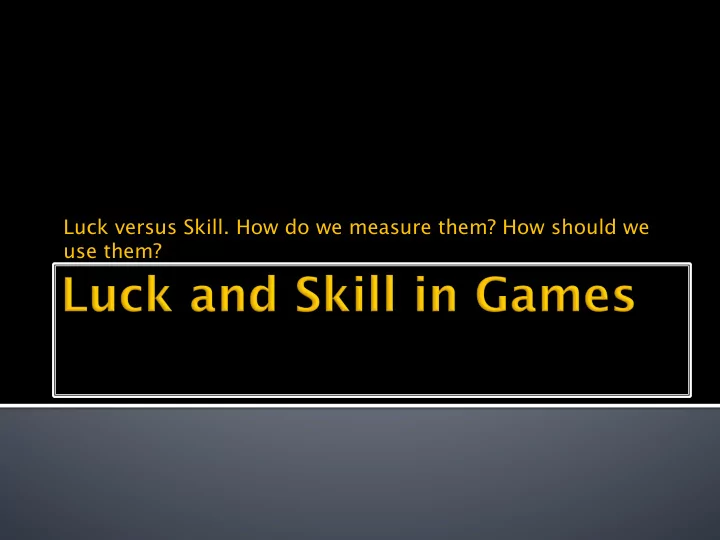

Luck versus Skill. How do we measure them? How should we use them?
There is too much luck in this game, not enough skill. There is no luck at all in this game, it is entirely skill.
§ Virtually every definition of game will state that indeterminacy is required --If they don’t state it, they imply it § What ‘creates’ indeterminacy? --Randomness
� These properties of games are very di ffj cult to define � They are also extremely counter- intuitive once you do define them
� Dice � Cards � Random Number Generators
Rock is strong � Simultaneous and hidden actions � Other players
� Memory � Accuracy � Speed � Strength
If a person had to choose between 2 doors, one which lead to victory and the other defeat – there is no doubt there is luck.
Winner Loser
Though his chances of winning the New York State Lottery 15 times in a row are better.
50,347,200 A large number is given. Players have 30 seconds to determine what that digit of π is.
50,347,200 …72309400496726834795020938476641109384758475485288 7 613… 7 Winner Loser A large number is given. Players have 30 seconds to determine what that digit of π is.
4th A large number is given. Players have 30 minutes to determine what that digit of π is.
4th None in 2000BC, tons in 250BC, almost none in 2000AD
� The ability to do something well � The intrinsic ability to achieve a di fg erential outcome � Skill is inherently defined as a comparison, even if only with your past self
� How do we measure skill? --Maximum win %? The pro “always” wins --Chain of “levels” of skill, say a 75% win rate over another tier --Elo, or similar rating --The complete set of information is the true expected win % of each player over each other player, throughout time --You must choose a slice, but choose wisely
Play standard chess but afterwards roll a die.
Play standard chess but afterwards roll a die. On a 1 the loser of the chess game wins the Rando Chess game.
It is hard to argue Rando Chess has less skill than regular chess. But it obviously has more luck.
All previous skill is still useful. No player ranking change. With slight modification, “Elo” ratings are the same! Same world champion, same chess books.
Poker Bingo Luck Tic Tac Toe Go Skill
§ Skill di fg erentials became harder to measure. More trials are needed to get the same accuracy in rankings as before. § Another way to say it: less payo fg for skill
� Is adding luck, thereby making skill harder to measure bad?
Players may reject the addition of luck. It moderates their reward. What does your audience want? What’s your value proposition?
� The more time your audience puts into a competitive game, the more they may expect to be rewarded for their skill
� Removing all indeterminacy makes your game very skill testing. � For example, we can play “who’s taller?”
� But we no longer have a game, we have a measurement � Which is fun to play at most once
Golf Soccer Pachinko Luck Foot Race Skill
Player Some psychographics are entertained by unexpected outcomes.
� Is adding luck, thereby making skill harder to measure good? � Obfuscation of skill has many benefits 1) In the best case, players blame their defeats on luck and wins on skill. Until deep knowledge is gained .
� Is adding luck, thereby making skill harder to measure good? � Obfuscation of skill has many benefits 1) In the best case, players blame their defeats on luck and wins on skill 2) The amount of people you can have a fun (i.e. reasonably indeterminate) game with goes up greatly
Too Too Too Too Too Easy Hard Too Too Easy Too Hard Hard Too Hard Easy Too Hard Too Easy Too Easy Just Hard Easy Right! Too Too Too Too Easy Too Too Too Too Easy Hard Easy Hard Hard Hard Easy In a game with low luck it is more di ffj cult to find an appropriately skilled opponent. You risk losing all the time or winning all the time.
� You might get the desired opponent skill, but maybe not the desired opponent
� Is Phil upset about less payo fg for skill in Poker?
The situation is incredibly complex. Any skill “curve” is possible, and while assuming player skill is defined by a normal (or any other) distribution with a single parameter is naïve, even if it is a practical necessity. For example, some elements of luck may only be accessed with high skill (say a bonus level), and some may only be accessed by performing poorly
Consider a Real Time Strategy game with randomized prices or technologies. Without randomness the community may decide it is all about Tanks. Players’ rating may be based primarily on tactical skill and hand-eye coordination Player A (Rating 2000), Player B (rating 1900), Player C (rating 1000)
With randomized prices occasionally Dragons will be viable.
Who picks the dragon first? Perhaps Player A can now beat player B more often if skill has been added in price e ffj ciency. But maybe Player A and Player C move closer to each other in win rate, if the strategic value of that e ffj ciency outweighs tactics
� Know your (intended) audience � What is your key value proposition? � How is your game going to be played? Dinner table? Family room? Internet? Solo? � Does your revenue model require replays? � Do your IP and marketing match your skill/luck interaction?
Recommend
More recommend